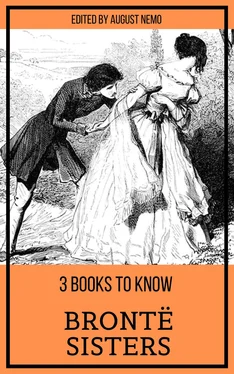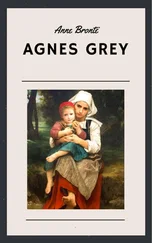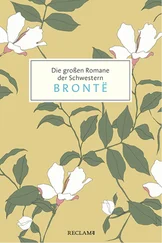‘Ruin! Mrs. Markham!’
‘Yes; it is spoiling the child. Even at his age, he ought not to be always tied to his mother’s apron-string; he should learn to be ashamed of it.’
‘Mrs. Markham, I beg you will not say such things, in his presence, at least. I trust my son will never be ashamed to love his mother!’ said Mrs. Graham, with a serious energy that startled the company.
My mother attempted to appease her by an explanation; but she seemed to think enough had been said on the subject, and abruptly turned the conversation.
‘Just as I thought,’ said I to myself: ‘the lady’s temper is none of the mildest, notwithstanding her sweet, pale face and lofty brow, where thought and suffering seem equally to have stamped their impress.’
All this time I was seated at a table on the other side of the room, apparently immersed in the perusal of a volume of the Farmer’s Magazine, which I happened to have been reading at the moment of our visitor’s arrival; and, not choosing to be over civil, I had merely bowed as she entered, and continued my occupation as before.
In a little while, however, I was sensible that some one was approaching me, with a light, but slow and hesitating tread. It was little Arthur, irresistibly attracted by my dog Sancho, that was lying at my feet. On looking up I beheld him standing about two yards off, with his clear blue eyes wistfully gazing on the dog, transfixed to the spot, not by fear of the animal, but by a timid disinclination to approach its master. A little encouragement, however, induced him to come forward. The child, though shy, was not sullen. In a minute he was kneeling on the carpet, with his arms round Sancho’s neck, and, in a minute or two more, the little fellow was seated on my knee, surveying with eager interest the various specimens of horses, cattle, pigs, and model farms portrayed in the volume before me. I glanced at his mother now and then to see how she relished the new-sprung intimacy; and I saw, by the unquiet aspect of her eye, that for some reason or other she was uneasy at the child’s position.
‘Arthur,’ said she, at length, ‘come here. You are troublesome to Mr. Markham: he wishes to read.’
‘By no means, Mrs. Graham; pray let him stay. I am as much amused as he is,’ pleaded I. But still, with hand and eye, she silently called him to her side.
‘No, mamma,’ said the child; ‘let me look at these pictures first; and then I’ll come, and tell you all about them.’
‘We are going to have a small party on Monday, the fifth of November,’ said my mother; ‘and I hope you will not refuse to make one, Mrs. Graham. You can bring your little boy with you, you know—I daresay we shall be able to amuse him;—and then you can make your own apologies to the Millwards and Wilsons—they will all be here, I expect.’
‘Thank you, I never go to parties.’
‘Oh! but this will be quite a family concern—early hours, and nobody here but ourselves, and just the Millwards and Wilsons, most of whom you already know, and Mr. Lawrence, your landlord, with whom you ought to make acquaintance.’
‘I do know something of him—but you must excuse me this time; for the evenings, now, are dark and damp, and Arthur, I fear, is too delicate to risk exposure to their influence with impunity. We must defer the enjoyment of your hospitality till the return of longer days and warmer nights.’
Rose, now, at a hint from my mother, produced a decanter of wine, with accompaniments of glasses and cake, from the cupboard and the oak sideboard, and the refreshment was duly presented to the guests. They both partook of the cake, but obstinately refused the wine, in spite of their hostess’s hospitable attempts to force it upon them. Arthur, especially shrank from the ruby nectar as if in terror and disgust, and was ready to cry when urged to take it.
‘Never mind, Arthur,’ said his mamma; ‘Mrs. Markham thinks it will do you good, as you were tired with your walk; but she will not oblige you to take it!—I daresay you will do very well without. He detests the very sight of wine,’ she added, ‘and the smell of it almost makes him sick. I have been accustomed to make him swallow a little wine or weak spirits-and-water, by way of medicine, when he was sick, and, in fact, I have done what I could to make him hate them.’
Everybody laughed, except the young widow and her son.
‘Well, Mrs. Graham,’ said my mother, wiping the tears of merriment from her bright blue eyes—‘well, you surprise me! I really gave you credit for having more sense.—The poor child will be the veriest milksop that ever was sopped! Only think what a man you will make of him, if you persist in—’
‘I think it a very excellent plan,’ interrupted Mrs. Graham, with imperturbable gravity. ‘By that means I hope to save him from one degrading vice at least. I wish I could render the incentives to every other equally innoxious in his case.’
‘But by such means,’ said I, ‘you will never render him virtuous.—What is it that constitutes virtue, Mrs. Graham? Is it the circumstance of being able and willing to resist temptation; or that of having no temptations to resist?—Is he a strong man that overcomes great obstacles and performs surprising achievements, though by dint of great muscular exertion, and at the risk of some subsequent fatigue, or he that sits in his chair all day, with nothing to do more laborious than stirring the fire, and carrying his food to his mouth? If you would have your son to walk honourably through the world, you must not attempt to clear the stones from his path, but teach him to walk firmly over them—not insist upon leading him by the hand, but let him learn to go alone.’
‘I will lead him by the hand, Mr. Markham, till he has strength to go alone; and I will clear as many stones from his path as I can, and teach him to avoid the rest—or walk firmly over them, as you say;—for when I have done my utmost, in the way of clearance, there will still be plenty left to exercise all the agility, steadiness, and circumspection he will ever have.—It is all very well to talk about noble resistance, and trials of virtue; but for fifty—or five hundred men that have yielded to temptation, show me one that has had virtue to resist. And why should I take it for granted that my son will be one in a thousand?—and not rather prepare for the worst, and suppose he will be like his—like the rest of mankind, unless I take care to prevent it?’
‘You are very complimentary to us all,’ I observed.
‘I know nothing about you—I speak of those I do know—and when I see the whole race of mankind (with a few rare exceptions) stumbling and blundering along the path of life, sinking into every pitfall, and breaking their shins over every impediment that lies in their way, shall I not use all the means in my power to insure for him a smoother and a safer passage?’
‘Yes, but the surest means will be to endeavour to fortify him against temptation, not to remove it out of his way.’
‘I will do both, Mr. Markham. God knows he will have temptations enough to assail him, both from within and without, when I have done all I can to render vice as uninviting to him, as it is abominable in its own nature—I myself have had, indeed, but few incentives to what the world calls vice, but yet I have experienced temptations and trials of another kind, that have required, on many occasions, more watchfulness and firmness to resist than I have hitherto been able to muster against them. And this, I believe, is what most others would acknowledge who are accustomed to reflection, and wishful to strive against their natural corruptions.’
‘Yes,’ said my mother, but half apprehending her drift; ‘but you would not judge of a boy by yourself—and, my dear Mrs. Graham, let me warn you in good time against the error—the fatal error, I may call it—of taking that boy’s education upon yourself. Because you are clever in some things and well informed, you may fancy yourself equal to the task; but indeed you are not; and if you persist in the attempt, believe me you will bitterly repent it when the mischief is done.’
Читать дальше











